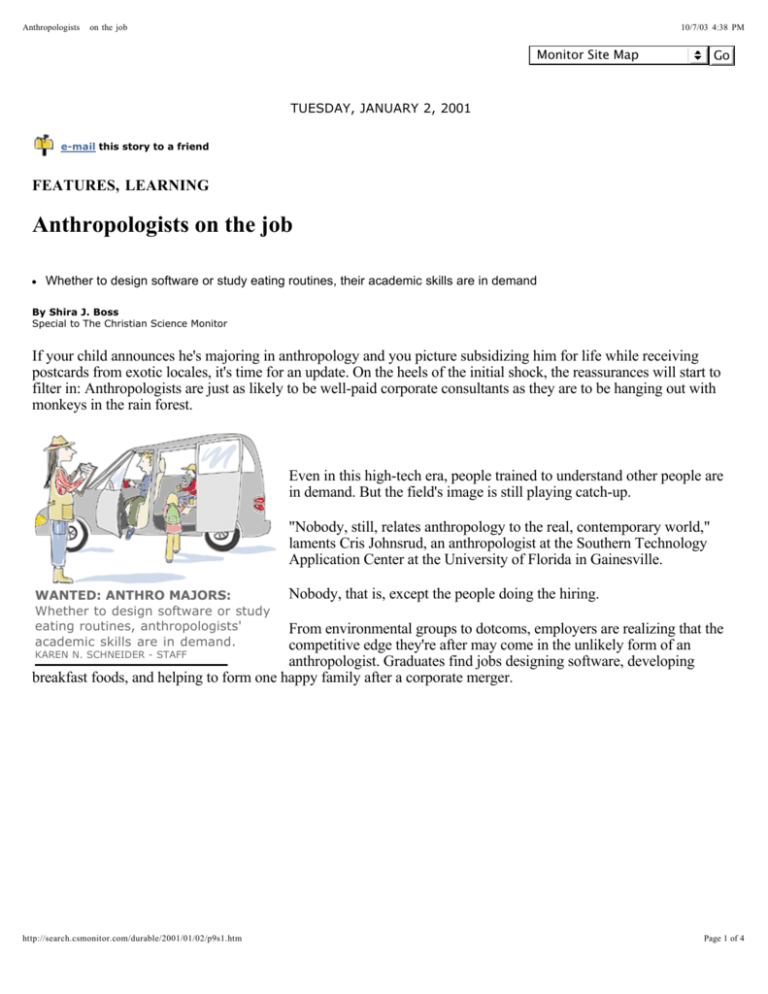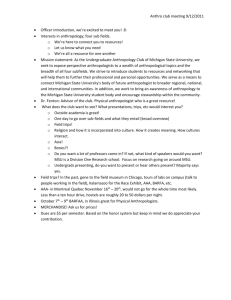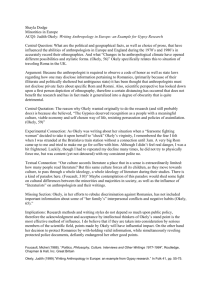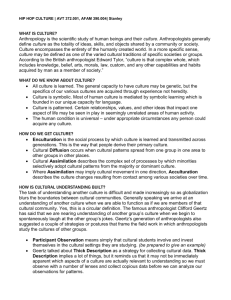
Anthropologists
on the job
10/7/03 4:38 PM
Monitor Site Map
Go
TUESDAY, JANUARY 2, 2001
e-mail this story to a friend
FEATURES, LEARNING
Anthropologists on the job
Whether to design software or study eating routines, their academic skills are in demand
By Shira J. Boss
Special to The Christian Science Monitor
If your child announces he's majoring in anthropology and you picture subsidizing him for life while receiving
postcards from exotic locales, it's time for an update. On the heels of the initial shock, the reassurances will start to
filter in: Anthropologists are just as likely to be well-paid corporate consultants as they are to be hanging out with
monkeys in the rain forest.
Even in this high-tech era, people trained to understand other people are
in demand. But the field's image is still playing catch-up.
"Nobody, still, relates anthropology to the real, contemporary world,"
laments Cris Johnsrud, an anthropologist at the Southern Technology
Application Center at the University of Florida in Gainesville.
WANTED: ANTHRO MAJORS:
Whether to design software or study
eating routines, anthropologists'
academic skills are in demand.
Nobody, that is, except the people doing the hiring.
From environmental groups to dotcoms, employers are realizing that the
competitive edge they're after may come in the unlikely form of an
KAREN N. SCHNEIDER - STAFF
anthropologist. Graduates find jobs designing software, developing
breakfast foods, and helping to form one happy family after a corporate merger.
http://search.csmonitor.com/durable/2001/01/02/p9s1.htm
Page 1 of 4
Anthropologists
on the job
10/7/03 4:38 PM
"Even most academic departments don't know the range and variety of careers
out there," says Susan Squires, president of the National Association for the
Practice of Anthropology.
MAKING IT PRACTICAL:
Cris Johnsrud uses her
anthropology training as a
director of research at the
Southern Technology
Application Center in
Gainesville, Fla.
KIM BAULDREE/SPECIAL TO THE
CHRISTIAN SCIENCE MONITOR
But colleges and universities are starting to adapt. As the University of Florida
anthropology club's motto reads, the field has moved "Beyond Bones and
Stones."
In the decade from 1987 to 1997, the number of anthropology majors more than
doubled, according to the American Anthropological Association (AAA), with
the number of PhDs up by more than a third. But until recently, it was rare to see
a job advertisement for an anthropologist. Most are trained for scholarly work,
but academic jobs are practically nonexistent.
"The responsible departments are now admitting that there are no jobs in
teaching," says Bill Young, managing editor of Anthropology News.
Fortunately, private-sector jobs are more than picking up the slack. Sapient, a company that develops software and
electronics, has more than two dozen anthropologists on staff. House anthropologists can also be found at such
companies as Intel, Kodak, Whirlpool, AT&T, and General Motors. Hallmark, for instance, hired an anthropologist
to go into people's homes and study family relationships.
Detroit's Wayne State University reorganized its anthropology department for survival during a 1980s recession.
Now, doctoral students in its Business and Industrial Anthropology program are often lured away by high-paying
jobs.
http://search.csmonitor.com/durable/2001/01/02/p9s1.htm
Page 2 of 4
Anthropologists
on the job
10/7/03 4:38 PM
"A new PhD just got a job paying $76,000, working for a big tech firm," says Marietta
Baba, chair of the department. "That entry-level salary used to be unheard of for an
anthropologist."
What do anthropologists have that companies want? Is it, as the AAA says in one of its
brochures, "social ease in strange situations"? When Dr. Johnsrud started working to find
practical applications for new technology, she says, "Everyone would look at me and
scratch their heads and say, 'What's an anthropologist doing here?' "
Three things set anthropologists apart: They're trained to look at a larger context, they
have a multicultural perspective, and they use a technique called "participant
observation" (e.g. studying monkeys by joining their clan) that exposes what people do
and want in a way surveys and focus groups do not.
"Engineers look at technology without looking at the broader social or cultural context,
so they are often surprised when something fails" in the real world, Johnsrud says.
"Anthropologists take a ... more holistic approach. We help people make connections...."
General Mills had heard from moms in focus groups that they wanted to serve their
families whole-grain breakfast foods. But when it hired a team of anthropologists last
year to look deeper, it got quite different results.
The team went into homes to watch the breakfast routine. Instead of whole-grain foods,
they found multicolored cereal. Or snacks eaten in the minivan on the way to school or
work.
FIELD RESEARCH:
Anthropologist Susan
Squires visits Lary
Lawson at his home
in Pescadero, Calif.
As a former
emergency-room
nurse, he'll give
feedback on
prototype equipment.
TONY AVELAR/SPECIAL TO
THE CHRISTIAN SCIENCE
MONITOR
As a healthy and portable alternative, they came up with Go-Gurt, a yogurt packaged so that it doesn't require a
spoon and can be frozen or refrigerated. It has enjoyed national success, says Dr. Squires, who was one of the
consultants.
Ed Liebow, who wrote his dissertation on the urban Indian population in Phoenix, now runs a research and
consulting firm that helps government agencies and private companies liaison with local communities. His firm has
developed Web sites where the public can learn how contamination affects them, or where welfare recipients can
see how their finances will be affected if they go to work.
"There's this classic role to play as a culture broker," Dr. Liebow says. "We know something about private industry
and the local community and can bridge the gap."
That cultural sensitivity has become especially important with the rise of the diverse workplace and global
marketplace.
"Most business students have never taken a cultural course," says Phil Gardner, director of the Collegiate
Employment Research Institute at Michigan State University. "Some of the stupid mistakes that corporations have
made cross-culturally have raised an interest in people who understand those differences."
Anthropology in the corporate world
The current wave of jobs for anthropologists outside of academia is not the first in United States history, as this
selective timeline shows:
http://search.csmonitor.com/durable/2001/01/02/p9s1.htm
Page 3 of 4
Anthropologists
on the job
10/7/03 4:38 PM
1930s: During a time of labor-management unrest and union formation, anthropologists try to help by using their
people skills to reduce conflict within companies.
World War II: Anthropologists are called upon to help industry become more productive.
1940s-1960s: Working in companies as organizational consultants is an accepted part of the field of anthropology.
1970s-1980s: Applied anthropology falls out of favor with the rise of US involvement in the Vietnam War. "There
was the fear that they would be used as spies in Vietnam, collecting data under the cover of being a researcher,"
says Marietta Baba, chair of the anthropology department at Wayne State University in Detroit. "If we get the
reputation of hurting people, we won't be able to talk to the people any more."
The mistrust of applied work extends to industry. The American Anthropological Association's ethical guide
includes a provision that any research performed by an anthropologist has to be public, which essentially bans
working for a corporation, Dr. Baba says (the provision would later be removed). Most academic departments
support that stance, sometimes warning students off jobs in the corporate sector.
1990s: The number of anthropology majors rises significantly. A split evolves between the academics who still
discourage working at corporations and those who want to go where the problems (and money) are.
With a global business climate and a greater sensitivity to cultural differences, businesses recognize anthropologists
as ideal "cultural brokers" who can help with product design, marketing, and communication with local
populations. Major corporations employ staff anthropologists. University departments add more applied courses to
their anthropology programs to better prepare graduates for work in the private sector.
2000: Listings on the Internet job board Monster.com for jobs in information technology include want-ads for
anthropologists. Anthropology PhDs can earn starting salaries pushing six figures working for corporations.
For further information:
Anthropologists Go Native in the Corporate Village Fast Company
Hot asset: Anthropology degrees
Coming of Age in Palo Alto: Anthropologists Find a Niche Studying Consumers for Companies in Silicon
Valley
Anthropologists at Work: Responses to Student Questions About Anthropology Careers
Please Note: The Monitor does not endorse the sites behind these links. We offer them for your additional research.
Home | Archive | Subscriptions | Get Free E-mail Update | Send Editor E-mail | Monitor Talk | Today's Paper | @csmonitor.com |
About Us/Help | Feedback
. Copyright 2000 The Christian Science Publishing Society. All rights reserved.
http://search.csmonitor.com/durable/2001/01/02/p9s1.htm
Page 4 of 4









